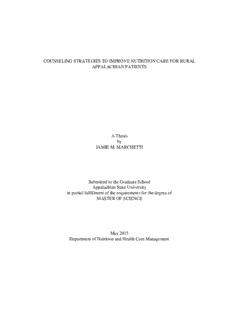
Counseling Strategies To Improve Nutrition Care For Rural Appalachian Patients PDF
Preview Counseling Strategies To Improve Nutrition Care For Rural Appalachian Patients
COUNSELING STRATEGIES TO IMPROVE NUTRITION CARE FOR RURAL APPALACHIAN PATIENTS A Thesis by JAMIE M. MARCHETTI Submitted to the Graduate School Appalachian State University in partial fulfillment of the requirements for the degree of MASTER OF SCIENCE May 2015 Department of Nutrition and Health Care Management COUNSELING STRATEGIES TO IMPROVE NUTRITION CARE FOR RURAL APPALACHIAN PATIENTS A Thesis by JAMIE M. MARCHETTI May 2015 APPROVED BY: Dr. Melissa D. Gutschall Chairperson, Thesis Committee Ms. Kyle L. Thompson Member, Thesis Committee Dr. Lisa S. McAnulty Member, Thesis Committee Dr. Sarah R. Jordan Chairperson, Department of Nutrition & Health Care Management Dr. Max Poole Dean, Cratis D. Willams Graduate School Copyright by Jamie M. Marchetti 2015 All Rights Reserved . Abstract COUNSELING STRATEGIES TO IMPROVE NUTRITION CARE FOR RURAL APPALACHIAN PATIENTS Jamie M. Marchetti, BS University of Wyoming Chairperson: Melissa D. Gutschall Chronic diseases are a particular concern for the rural Appalachian population. Culturally sensitive nutrition counseling strategies may help this population overcome barriers to good nutrition and prevent and manage chronic diseases. Qualitative semi- structured interviews were conducted with 36 practitioners (registered dietitians and dietetic interns) and 15 rural patients (n = 51) to investigate dietary obstacles faced by rural patients and counseling strategies considerate of the specific needs and environment of the rural population,. These participants, as well as additional respondents, also completed a follow-up questionnaire regarding the same topics (n = 61). Interviews were transcribed and analyzed using coding and grouping of concepts from the data and categorized by themes (NVIVO Qualitative Analysis Software, QSR International, Version 10, 2013). Questionnaires were analyzed using descriptive statistics and t-tests to compare perspectives of practitioners and patients (SPSS Statistics, IBM, Version 20, 2012). Strategy subthemes were categorized into four broader themes from the previously established Rural Nutrition Care Model, including 1) Access & Resources (Budgeting, 18 mentions; Planning, 15 mentions; Resources 15 mentions), 2) Sociocultural Influences (Whole-Family Approach, 24 mentions; Simple Messages, 19 mentions; Building Rapport & Relationships, 18 mentions; Avoiding iv Assumptions & Judgment, 13 mentions), 3) Traditional Foods (Gardening, 20 mentions; How to Cook, 12 mentions), and 4) Health Behaviors (Small Changes, 20 mentions; Prevention, 10 mentions). Questionnaire results indicated that practitioners and patients did not always share the same view of the nutrition context of the rural population (P values compared to P < 0.05). The combination of interview and questionnaire data provided valuable insights regarding the success of various nutrition counseling strategies with sensitivity to the cultural framework of the rural population. v Dedication I dedicate my thesis work to my family and friends. A special feeling of appreciation to my parents, Samuel and Nanette Marchetti, and brother, Marion Marchetti, for their loving support and encouragement. I also dedicate this thesis to Jeff Krissek in deepest gratitude of his unflagging affection and belief in me. Finally, heartfelt thanks to those who have shared with me their dear friendship. vi Acknowledgments I would like to express my gratitude to the University Research Council and Graduate Research Associate Mentoring Program for their financial support of this research. I would also like to thank Ellen Lawrence, MS, RD, Lauren Keaton, MS, RD, and Elizabeth DiRusso, MS, for their contributions in data collection and analysis in the first phase of the study. vii Table Of Contents Abstract .................................................................................................................................... iv Dedication ................................................................................................................................ vi Acknowledgments................................................................................................................... vii Foreword .................................................................................................................................. ix Chapter 1: Introduction ............................................................................................................. 1 References ................................................................................................................................. 5 Chapter 2: Article ...................................................................................................................... 6 Vita .......................................................................................................................................... 38 viii Foreword Chapter 2 of this thesis will be submitted to the Journal of the Academy of Nutrition and Dietetics, a peer-reviewed journal published by Elsevier; it has been formatted according to the style guide for that journal. ix 1 CHAPTER 1: INTRODUCTION Rural culture plays a role in how members of the rural population understand, receive, and access health care. Cultural differences can lead to differing interactions with health care systems from individuals of various cultures. However, health care systems generally use the same protocol-based approach for all patients. As Farmer, et al., stated in their research of culture and rural health, “Incorporating understanding that there are different cultural beliefs about health and illness into the health care system is challenging. Practitioners’ first response is likely to be that the clients’ beliefs conflict with the system rather than vice versa.”1 Thus, the culture with which an individual identifies impacts the ways in which they comprehend and use health care. A more thorough understanding of rural Appalachian culture can help to better serve this rural population in terms of health care. Various aspects of Appalachian culture influence how Appalachian people in particular access and receive health care. As Susan Keefe described, “…core values associated with Appalachian culture include egalitarianism, independence and individualism, personalism, familism, a religious world view, neighborliness, love of the land, and the avoidance of conflict.”2 Violation of cultural norms may create a barrier to members of the rural Appalachian culture for access or receipt of adequate health care. Chronic diseases are a particular concern for the rural Appalachian population. Past research has shown that obesity, diabetes, heart disease, and cancer are problematic in the Appalachian region.3,4 Behaviors that are unhealthy, such as tobacco use, lack of physical activity, and poor dietary patterns are common in Appalachia. These factors contribute to
Description: